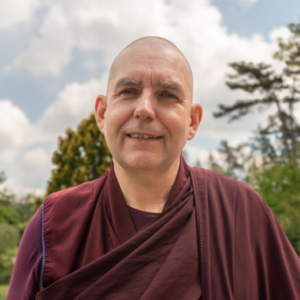The Third Turning of the Wheel of Dharma:
Yogācāra for Mādhyamikas
with Jay Garfield & Venerable Losang Gendun
Many people who take Madhyamaka Buddhism seriously, especially those who have studied within the Tibetan tradition, take for granted the idea that all of the Buddhist schools are arranged in a hierarchy of sophistication or correctness. According to this idea, the two Madhyamaka schools are at the top of the league while Yogācāra occupies third place, as “Mahāyāna for Dummies.” But there is a better way to understand the relation between Madhyamaka and Yogācāra, with roots in classical Tibetan thought. The Dalai Lama XIV has put it this way: “Madhyamaka presents emptiness from the side of the object; Yogācāra presents emptiness from the side of the subject.”
In these four sessions, we explore the Sutra Unravelling the Thought (Saṃdhinirmocana-sūtra) and Vasubandhu’s Treatise on the Three Natures (Trisvabhāvanirdeśa) with this idea in mind—to show Yogācāra is not inconsistent with Madhyamaka, but instead offers a deep analysis of the subjective aspect of emptiness and of the nature of our experience.
Additional Materials
Additional Optional Readings:
1. Making Sense of Mind Only: Why Yogacara Buddhism Matters by William S. Waldron
2. Madhyamaka and Yogācāra: Allies or Rivals by Jay Garfield (ed.), Jan Westerhoff (ed.)
3. Engaging Buddhism: Why It Matters to Philosophy by Jay L. Garfield (The Phenomenology Chapter is relevant for this course)
Recordings
This is a playlist. To jump to a particular session, click the playlist icon (“3 vertical dots”) near the top-right corner of the video frame to select video.
About the Facilitator/Teacher
 Jay L. Garfield is Doris Silbert Professor in the Humanities and Professor of Philosophy and Buddhist Studies at Smith College, Visiting Professor of Buddhist philosophy at Harvard Divinity School, Professor of Philosophy at Melbourne University and Adjunct Professor of Philosophy at the Central Institute of Higher Tibetan Studies. Academicinfluence.com has identified him as one of the 50 most influential philosophers in the world over the past decade.
Jay L. Garfield is Doris Silbert Professor in the Humanities and Professor of Philosophy and Buddhist Studies at Smith College, Visiting Professor of Buddhist philosophy at Harvard Divinity School, Professor of Philosophy at Melbourne University and Adjunct Professor of Philosophy at the Central Institute of Higher Tibetan Studies. Academicinfluence.com has identified him as one of the 50 most influential philosophers in the world over the past decade.
Garfield’s research addresses topics in the foundations of cognitive science and the philosophy of mind; metaphysics; the history of modern Indian philosophy; topics in ethics, epistemology and the philosophy of logic; the philosophy of the Scottish enlightenment methodology in cross-cultural interpretation; and topics in Buddhist philosophy, particularly Indo-Tibetan Madhyamaka and Yogācāra. He is the author or editor of over 30 books and over 200 articles, chapters, and reviews.
Garfield’s most recent books are How to Lose Yourself (with Maria Heim and Robert Sharf 2024), Getting Over Ourselves: How to be a Person Without a Self (2022), Knowing Illusion: Bringing a Tibetan Debate into Contemporary Discourse (with the Yakherds 2021, Buddhist Ethics: A Philosophical Exploration (2021), ̛What Can’t Be Said: Paradox and Contradiction in East Asian Thought (with Yasuo Deguchi, Graham Priest, and Robert Sharf 2021), The Concealed Influence of Custom: Hume’s Treatise From the Inside Out (OUP 2019), Minds Without Fear: Philosophy in the Indian Renaissance (with Nalini Bhushan, 2017), Dignāga’s Investigation of the Percept: A Philosophical Legacy in India and Tibet (with Douglas Duckworth, David Eckel, John Powers, Yeshes Thabkhas and Sonam Thakchöe, 2016) Engaging Buddhism: Why it Matters to Philosophy (2015), Moonpaths: Ethics and Emptiness (with the Cowherds, 2015) and (edited, with Jan Westerhoff), Madhyamaka and Yogācāra: Allies or Rivals? (2015).
 Venerable Losang Gendun has dedicated nearly four decades to practicing Buddhism and has served as a Bhikshu (Buddhist monk) in the Tibetan tradition for the past 18 years. Prior to his ordination, he worked in diverse fields such as palliative care, technology, refugee organizations, and commercial management. His extensive training includes ten years of studying Buddhist philosophy and practice in monasteries across France, India, Nepal, and Myanmar. Additionally, he spent over four years in retreat, immersing himself in Tibetan sutra and tantra, as well as the Burmese Theravada Forest Tradition.
Venerable Losang Gendun has dedicated nearly four decades to practicing Buddhism and has served as a Bhikshu (Buddhist monk) in the Tibetan tradition for the past 18 years. Prior to his ordination, he worked in diverse fields such as palliative care, technology, refugee organizations, and commercial management. His extensive training includes ten years of studying Buddhist philosophy and practice in monasteries across France, India, Nepal, and Myanmar. Additionally, he spent over four years in retreat, immersing himself in Tibetan sutra and tantra, as well as the Burmese Theravada Forest Tradition.
For the last 15 years, Ven. Gendun has been a dedicated teacher, sharing his knowledge of Buddhist philosophy, psychology, and meditation worldwide. He serves the aspirations of H.H. the Dalai Lama and Lama Zopa Rinpoche as part of the FPMT (Foundation for the Preservation of the Mahayana Tradition). Ven. Gendun is also a member of Mind & Life Europe, a multidisciplinary laboratory that brings together researchers and contemplative practitioners to explore the nature of experience.
Beyond his Buddhist affiliations, Ven. Gendun serves as an interreligious canon at the Peace Cathedral in Tbilisi, Georgia, and feels at home at a Mevlavi Sufi dargah in Istanbul. In 2023, he founded The Buddha Project, which engages in long-term guidance for Buddhist meditators, scientific research, art projects, and intercontemplative social engagement.


